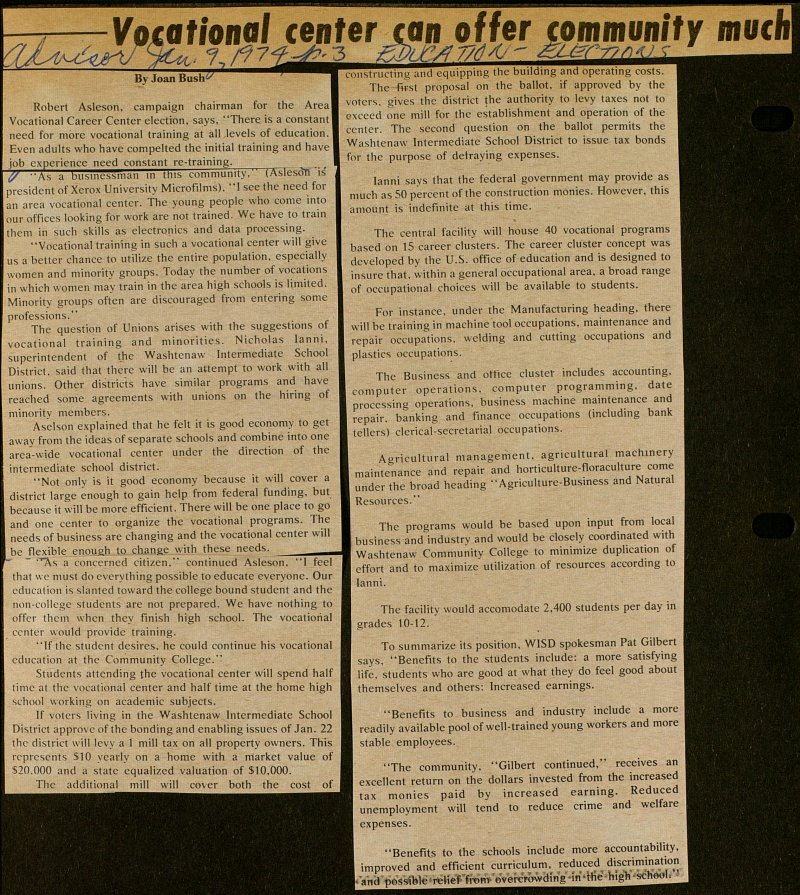Vocational Center Can Offer Community Much

Robert Asleson, campaign chairman for the Areal Vocational Career Center election, says, "There is a constant! need for more vocational training at all levéis of education.l Even adults who have compelted the initial training and have I job experience need constant re-training. t I P "As a businessman in tnis community, (Asleson is i president of Xerox University Microfilms), "1 see the need for an area vocational center. The young people who come into our offices looking for work are not trained. We have to train them in such skills as electronics and data processing. "Vocational training in such a vocational center will give us a better chance to utilize the entire population, especially women and minority groups. Today the number of vocations in which women may train in the area high schools is limited. Minority groups often are discouraged from entering some professions." The question of Unions arises with the suggestions of vocational training and minorities. Nicholas lanni, superintendent of the Washtenaw Intermedíate School District, said that there will be an attempt to work with all unions. Other districts have similar programs and have reached some agreements with unions on the hiring of minority members. Aselson explained that he feit it is good economy to get away from the ideas of separate schools and combine into one area-wide vocational center under the direction of the intermedíate school district. "Not only is it good economy because it will cover a district large enough to gain help from federal funding, but because it will be more efficiënt. There will be one place to go and one center to organize the vocational programs. The needs of business are changing and the vocational center will be flexible enough to change with these needs. ____- _ '"""As a concerned citizen," continued Asleson, "I feel that we must do cverything possible to edúcate everyone. Our cducation is slanted toward the college bound student and the non-college students are not prepared. We have nothing to offer them when they finish high school. The vocational center would provide training. "If the student desires, he could continue his vocational cducation at the Community College." Students attending the vocational center will spend half time at the vocational center and half time at the home high school vvorking on academie subjects. If voters living in the Washtenaw Intermedíate School District approve of the bonding and enabling issues of Jan. 22 the district will levy a 1 mili tax on all property owners. This represents $10 yearly on a home with a rriarket valué of S20.000 and a state equalized valuation of $10,000. The additional mili will cover both the cost of constructing and equipping the building and operating costs. The fitst proposal on the ballot, if approved by the votéis, gives the district the authority to levy taxes not to cxceed one mili for the establishment and operation of the center. The second question on the ballot permits the Washtenaw Intermedíate School District to issue tax bonds for the purpose of detraying expenses. Ianni says that the federal government may provide as much as 50 percent of the construction monies. However, this amount is indefinito at this time. The central facility will house 40 vocational programs based on 15 career clusters. The career cluster concept was developed by the U.S. office of education and is designed to insure that. within a general oceupational área, a broad range of oceupational choices will be available to students. For instance. under the Manufacturing heading, there will be training in machine tooi occupations, maintenance and repair occupations. weiding and cutting occupations and plastics occupations. The Business and ottice cluster includes accounting, computer operations, computer programming, date processing operations, business machine maintenance and repair, banking and finance occupations (including bank tellers) clerical-secretarial occupations. Agricultura! management, agricultural machinery maintenance and repair and horticulture-floraculture come under the broad heading Agriculture-Business and Natural Resources." The programs would be based upon input from local business and industry and would be closely coordinated with Washtenaw Community College to minimize duplication of cffort and to maximize utilization of resources according to lanni. The facility would accomodate 2,400 students per day in grades 10-12. To summarize its position, WISD spokesman Pat Gilbert says, "Benefits to the students include: a more satisfying life, students who are good at what they do feel good about themselves and others: Increased earnings. "Benefits to business and industry include a more readily available pool of well-trained young workers and more stable employees. "The community, "Gilbert continued," receives an excellent return on the dollars invested from the increased tax monies paid by increased earning. Reduced unemployment will tend to reduce crime and welfare expenses. "Benefits to the schools include more accountability, improved and efficiënt curriculum, reduced discrimination and possible relief from overcrowding in-the high school.